Sacramento program worked with the chronically homeless. For some, the result was eviction
Carlton Franklin was days away from his eviction deadline but no closer to finding housing.
Franklin, 62, sat on his bed in his studio apartment, surrounded by paperwork and wept. He was one of at least 17 people evicted this spring by nonprofit Next Move Homeless Services.
He is a retired barber who proudly grew up in Sacramento. But he also condemns the way poor people are treated in this city and state.
“This is Sacramento, it’s the capital. But Sacramento don’t care about nobody,” Franklin said in early March. “People don’t have no empathy ... In California it’s like, if you can’t get money, you can sleep on the ground like a dog.”
Among the papers spilled from a blue accordion folder was a yellow legal pad that contained dozens of phone numbers for organizations Franklin called to inquire about housing. Most of the numbers were crossed out. He had repeatedly been told no housing was available, and to join waiting lists that already had hundreds of homeless people on them.
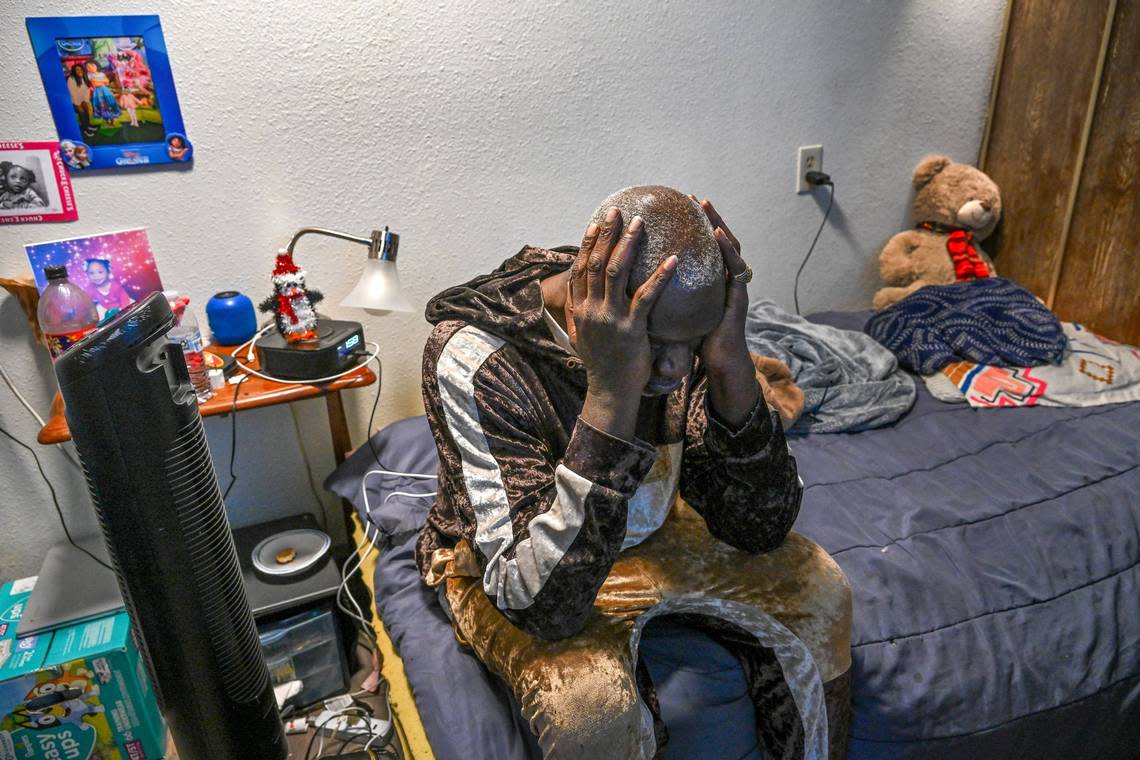
Franklin’s predicament started just before Thanksgiving when Next Move taped notices to his door and those of neighbors that stated they had to pay $6,180 in back rent or leave. They were shocked.
They had been living in the Citrus Heights former senior living facility called Auburn Oaks since May 2021 without paying rent. Yes, former residents told The Sacramento Bee, they had signed leases when they moved in that stated they would pay $772 per month in rent, plus $3,862 in move-in costs. But staff told the residents that the lease was a meaningless formality, and they would not need to pay, four former residents told The Bee.
Next Move, which is a subsidiary of Goodwill, in 2021 received approximately $2.7 million in county funding to house about 80 homeless people for about a year in Auburn Oaks. Like Franklin, most of the Auburn Oaks tenants were seniors and had stayed in the state’s former Project Roomkey COVID-19 isolation motels. The county closed the motels once state funding expired.
The rent was only covered for a year because it was under a program called “rapid rehousing,” said Next Move Executive Director Debbie Hughes.
“The goal is to support them through the transition and get them established in their unit,” Hughes said.
About a year after the tenants moved into Auburn Oaks, the county contract with Next Move to cover the tenants’ rent ended, and Next Move sent all tenants a letter, Hughes said.
Hughes provided a redacted copy of the notice, dated March 17, 2022, which says tenants will have to start paying their own rent starting the next month.
But Franklin and three other former residents told The Bee that the tenants were never told they would be on the hook for rent.
Brenda White lived at the complex with her husband Shawn, who is in a wheelchair. She said the Next Move staffers told her when she signed the lease agreement, the county would be paying the rent in perpetuity.
“They made us sign a paper for the room rent and told us that it was for the county so that they could get paid,” said Brenda White, 49.
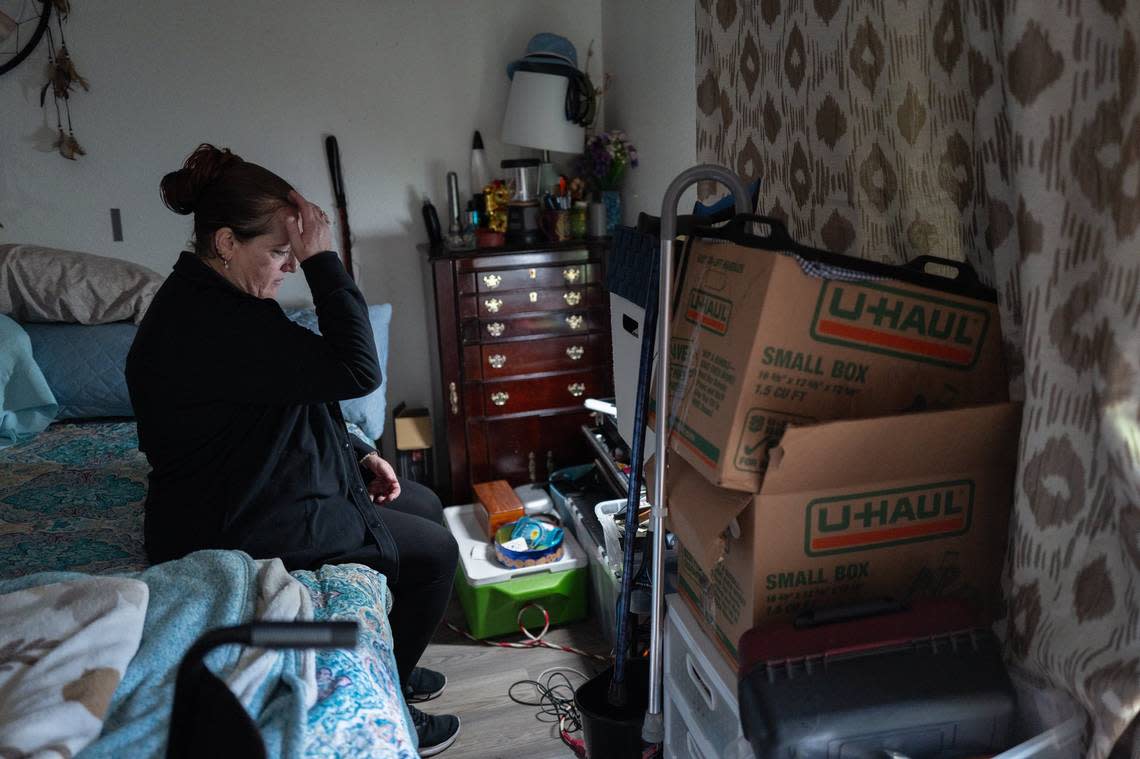
THE LOCKOUT PROCESS BEGINS
The Whites said they only learned that the county was not covering their rent in October 2023 when an eviction notice appeared on their door. Since then, identical notices appeared on the doors of at least 15 others, The Bee learned from court records and eviction records obtained through the California Open Records Act.
“They did not provide us a copy of (the lease) until (Next Move) tried to take us, and everyone else, to court,” Brenda White said.
Since Oct. 1, Next Move has filed unlawful detainers against at least 17 Auburn Oaks residents, according to court records. An unlawful detainer starts the formal court process for an eviction, which can end up on a person’s record and be viewed by potential landlords.
That process can lead to Sheriff’s deputies changing the locks on the apartment. Sometimes tenants lose belongings they did not manage to remove prior to the lockout.
The Sheriff’s Office has started the lockout process for at least 14 people, according to Sheriff’s Office records that The Bee obtained through a public records request.
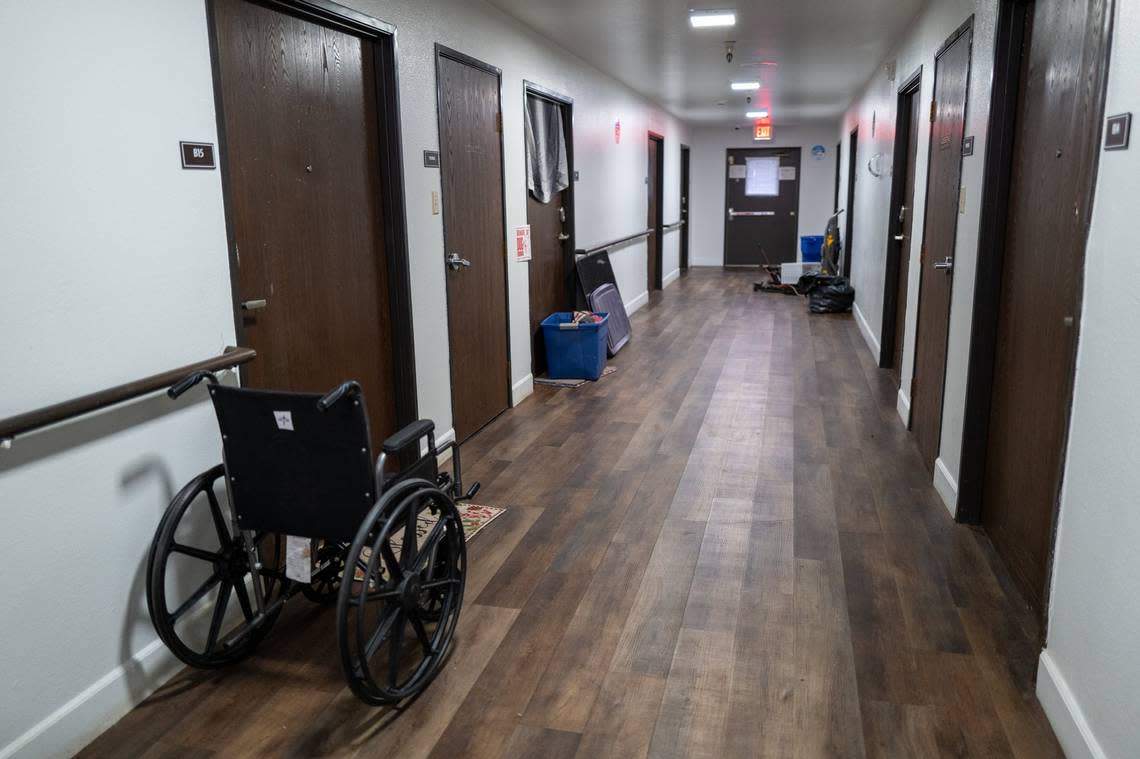
A Bee reporter observed Hughes and three Sheriff’s deputies enter the building on March 13 and knock on the door of one unit. Hughes asked the reporter to stop recording and declined to answer questions about whether a lockout was taking place.
As of May 3, the building was owned by Carmichael-based Auburn Oaks Center LLC, which has owned it since September 2020. That LLC is registered to Pete Halimi, president of Carmichael-based Oracle Properties, who did not respond to a call seeking comment.
HEALTH ISSUES COMPLICATE REHOUSING PROGRAM
From the outset, Hughes said, the idea was to help people get jobs and identification documents so they could afford the $772 a month rent and could stay at Auburn Oaks. About 20 people did so.
Next Move’s contract with the county stipulates that services would be provided to help tenants make the transition to covering their rent.
The contract states: “This agreement is for the provision of property related tenant services (PRTS) for the flexible housing pool (FHP), which also includes the flexible supportive rehousing program (FSRP). The FHP will utilize ongoing PRTS and through separate agreements, intensive case management services to provide community-based supportive housing options for persons experiencing chronic or long-term homelessness”
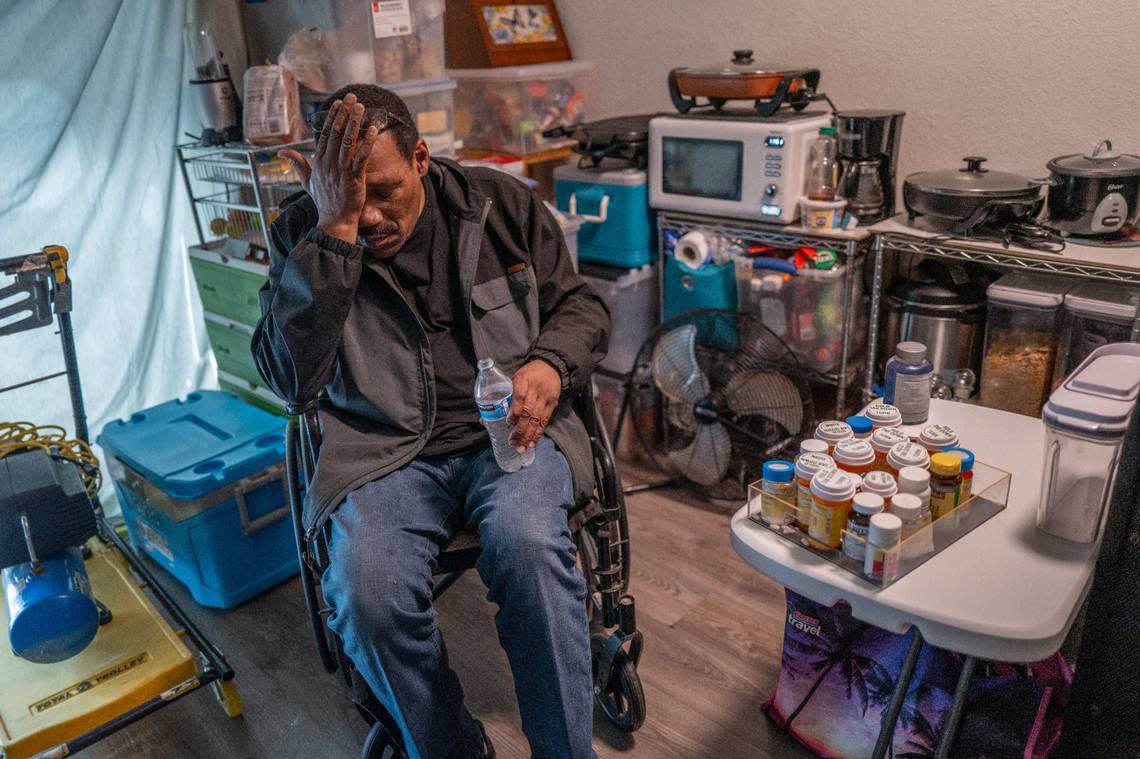
Hughes said Next Move provided that support and enumerated the services offered.
“This support included submitting voucher applications, social security income applications, employment referrals and more to assist the client to achieve self-sustainability,” Hughes said. “This process of course only works when both parties are contributing to the goal.”
Franklin said he did not receive those services while at Auburn Oaks. The Whites said they did not need those services. They already have a Section 8 voucher, in which the federal government pays a portion of rent, and receive disability payments. Shawn White’s health issues qualify him for disability, and his wife Brenda serves as his caretaker and hasn’t worked since 2015. They fall in Sacramento’s less visible but large homeless segment who are homeless because their income is not enough to afford non-subsidized rent.
Shawn White noted that most of the tenants of Auburn Oaks faced distinct challenges. He is 62 and suffers from spinal stenosis and degenerative disc disease. His wife has diabetes.
“Everyone came from different walks of life but need housing,” he said during an interview in Franklin’s room in March, weeks ahead of his eviction deadline. “They are all over 55, severely disabled or have mental health issues and we got no check ins.”
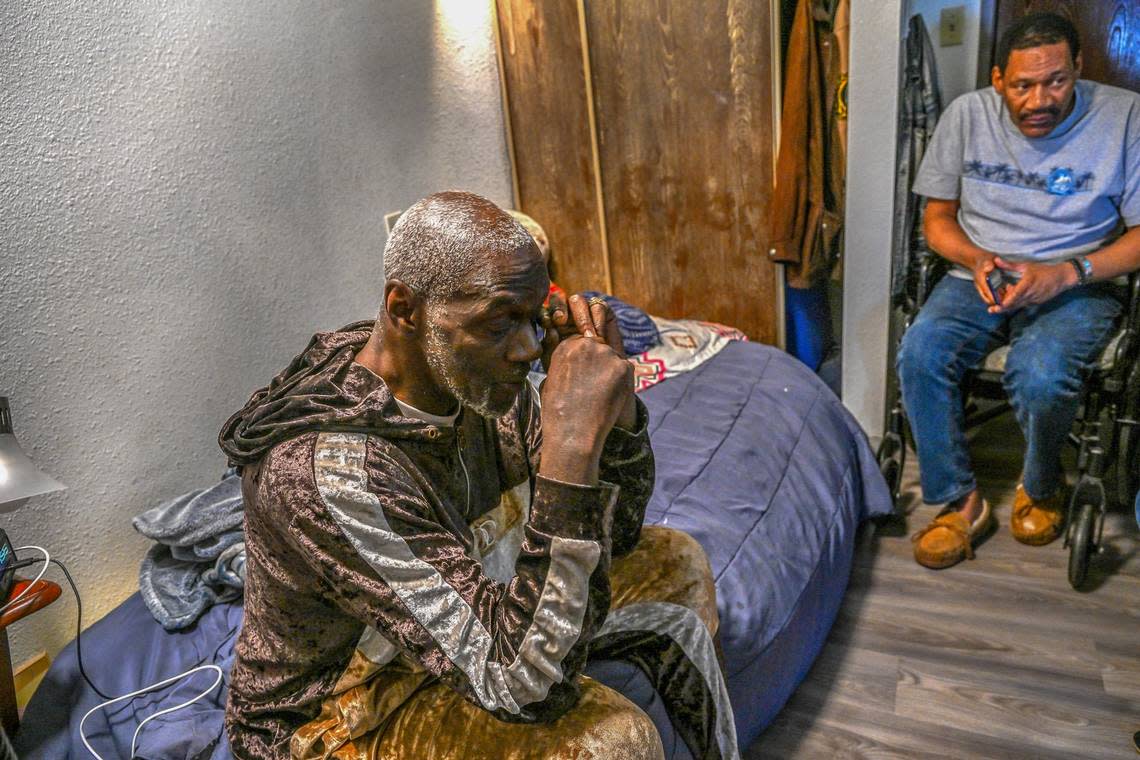
That’s part of why they had to leave, Hughes said.
“When working with this segment of the population, there are a number of individuals that have medical and (mobility) issues,” Hughes wrote. “Auburn Oaks is just an apartment complex so wrap around services are not included in the lease agreement.”
White said the lack of check-ins could have contributed to the deaths of at least three residents at the building — Floyd Kelly, Gregory Bell, and Richard Meyer. All the causes were ruled to be drug-related, according to death reports from the Sacramento County Coroner’s Office. Another man, Michael Fassler, died in October 2023, six months after he was evicted. The coroner’s office has not yet released the cause of Fassler’s death.
“That place is killing everybody,” Brenda White said.
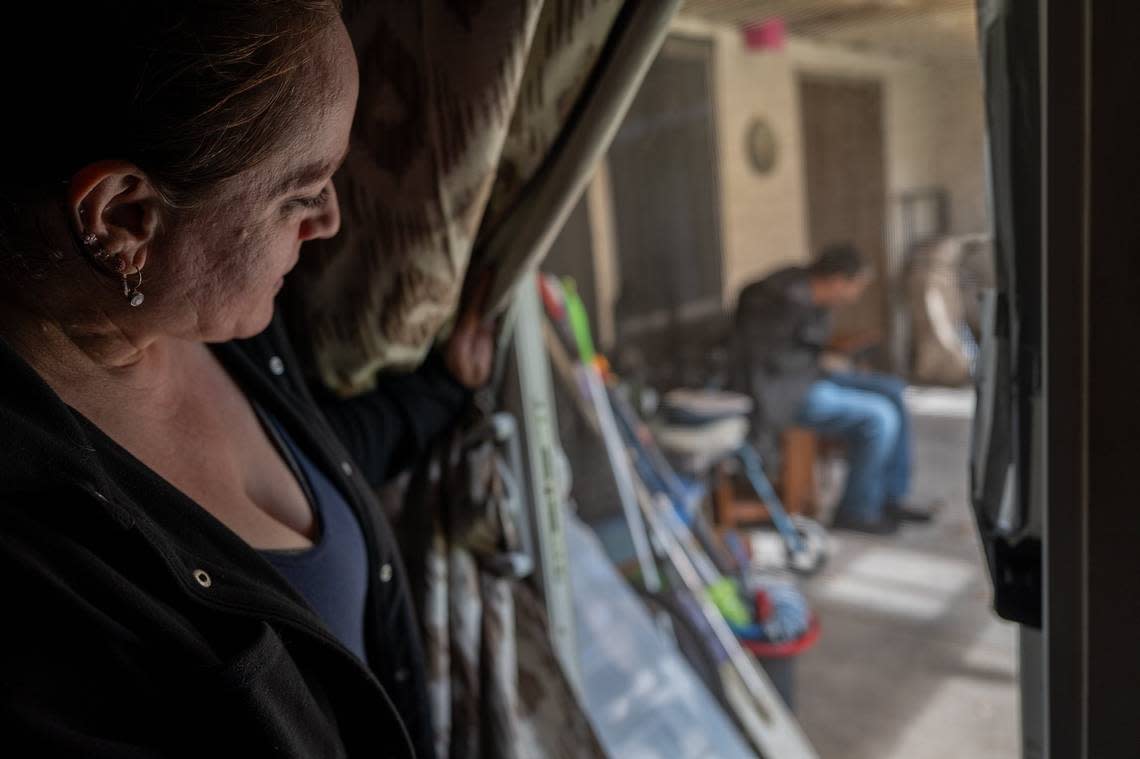
Hughes and county spokeswoman Janna Haynes declined comment on the deaths but said that drugs were banned from the building.
“Any death is tragic in our programs, but what we know about those that were part of Project Roomkey, is that they were the most vulnerable – older, a history of medical issues,” Haynes said in an email. “These vulnerabilities were one of the reasons they were eligible for PRK in the first place. We also know that there are some acute behavioral health challenges with these guests. We are grateful that these folks were inside, cared for and safe when they passed instead of dying on the streets.”
HOMELESS DESPITE SECTION 8 VOUCHERS
Shanna Simons, another resident evicted from Auburn Oaks, said she was presented twice with housing options where she and her boyfriend could move.
“We put money on a place twice to do credit checks only to come back to, we did not qualify,” Simons said. “Why wouldn’t a housing counselor know this? She assured us both times we would get in. I just want help with housing like we were promised.”
Like the Whites, Simons has a Section 8 voucher, but has still been unsuccessful in finding a home.
They are among the roughly 1,000 homeless people in Sacramento who can’t find housing despite having Section 8 vouchers. Sacramento’s rental market is tight. Despite laws against it, homeless people with vouchers have told The Bee landlords sometimes turn down people with vouchers due to stereotypes that poor people bring crime and damages to the unit.
Hughes said anyone could use a Section 8 voucher to stay at Auburn Oaks, if they had one, but Simons and the Whites said they were never offered that option.
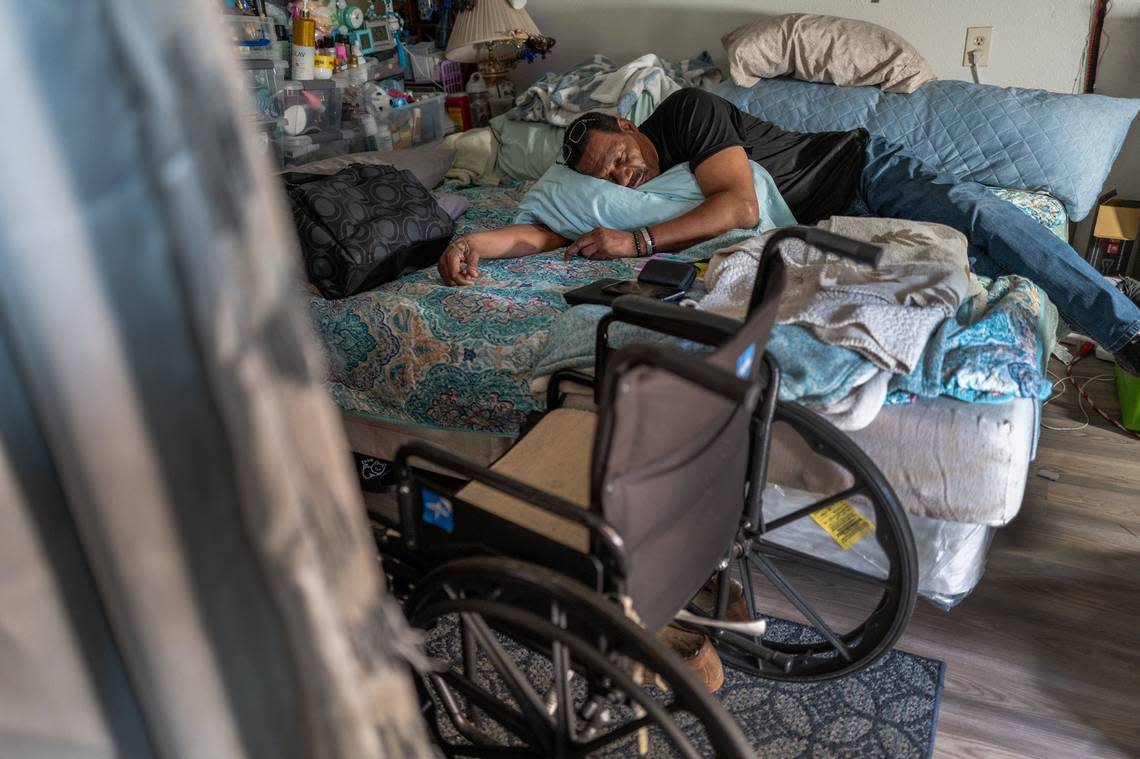
Finding housing in Sacramento is difficult for those such as the Whites, who can’t work and live off a monthly disability check of less than $1,000. Since 2021, 521 extremely low-income housing units have been built in Sacramento, according to a new city report. But the city needs 4,711 more to meet its state goals.
For every one person who becomes housed, three more lose housing, according to Sacramento County officials.
DID WE GET WHAT WE PAID FOR?
The county has signed over a dozen contracts with Next Move for homeless services since 2020, including two, totaling $2.7 million, for Auburn Oaks.
The county contracts say the county has the ability to audit Next Move at any time. Though county staff plan to produce a financial report later this year, they have never done an audit.
County spokeswoman Haynes defended the county’s large ongoing contracts with Next Move.
“The work is challenging for any organization,” Haynes said in an email.. “We are grateful that they are available and qualified to manage programs that the County funds and we will continue to work with them as long as it makes sense.”
The evictions from Auburn Oaks appear to fly in the face of Next Move’s mission statement.
“Founded in 1972, Next Move Homeless Services Inc. is a powerful force in moving people experiencing homelessness to higher levels of self-sufficiency through housing ... in order to bring stability to those most vulnerable,” stated Next Move’s Form 990 for 2022, the most recent year available.
But instead of stability, some of the Auburn Oaks tenants are actually worse off after being served by Next Move. At least three people are even less likely to find housing than they used to be because they now have an eviction on their records.
Hughes said the organization only took the steps that resulted in putting the eviction on those tenants’ records if they did not leave after getting warnings.
“The tenants who have been served (eviction) notices for non-payment have remained housed with three meals provided daily without paying rent for almost two years,” Hughes said. “We do not want to add to their barriers, nor do we anticipate collecting on any back owed rents, but have to follow through if they do not follow the agreement and turn the unit over as agreed upon.”
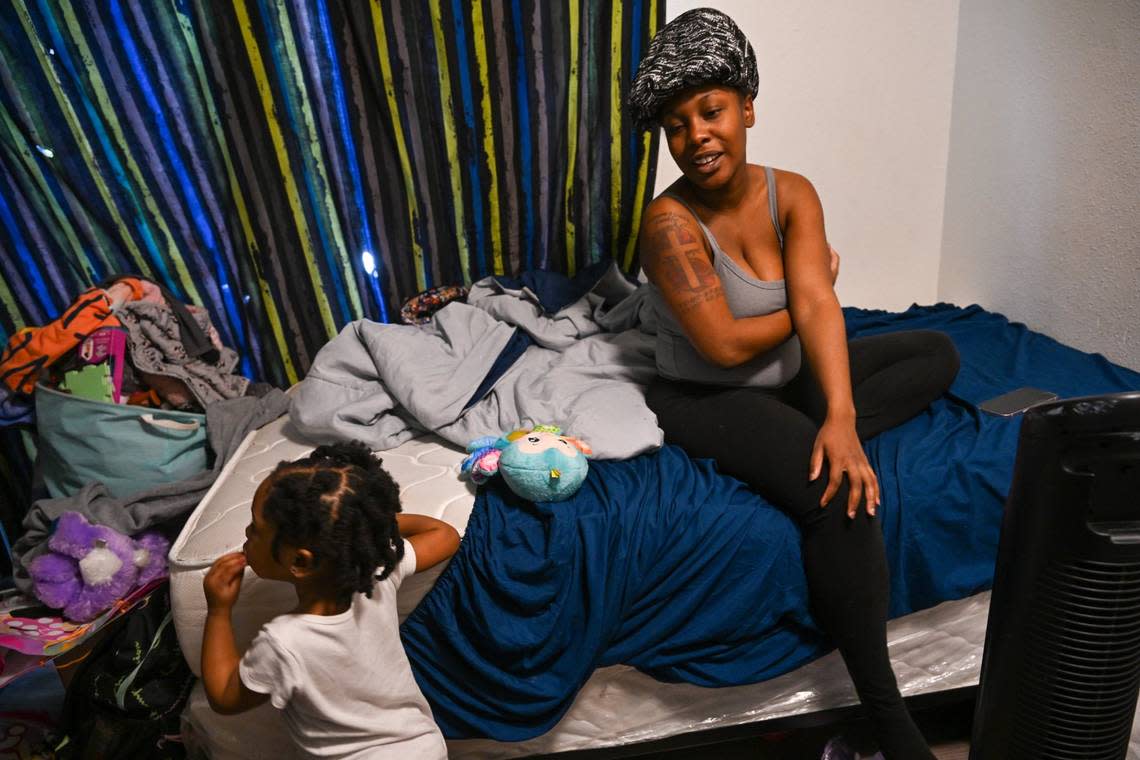
Next Move placed a three-day eviction notice on Charles Brown’s door on Aug. 18, 2023 stating he had to pay $6,180. By the time he showed up for a November hearing, the total increased to $8,085. The eviction was set for five days after Thanksgiving. Brown tried to fight it in court.
“I will be forced to vacate my home before I can find another place to live,” Brown wrote by hand in a court document. “My inability to find another place to live is due to a hardship I suffer. In addition I’m experiencing an untreated breathing problem.”
Unlike Next Move, represented by a Carlsbad attorney, Brown could not afford a lawyer. Sacramento Superior Court Judge Julie Yap ruled that Next Move could move forward with evicting Brown.
“No good cause found,” the ruling states, referring to a cause that would be needed to halt the eviction.
The Bee could not locate Brown for this story. The eviction is now on his record.
Carolyn Martin also tried to fight her eviction in court without an attorney.
“Defendant is not bound by the May 2021 rental agreement, defendant does not owe any rent money, defendant never received 3 day notice because I was told it was a program,” Martin wrote.
During a hearing two days before Christmas, a judge ruled that the eviction would stand. She was ordered to leave Jan. 2.
Some residents who faced eviction were able to find housing rather than end up on the streets. Curtis Freeman is one those lucky ones and now lives in a Natomas Boulevard senior living facility.
“My navigator got me a spot before all that happened,” Freeman said. “But it ain’t right for the others.”
Things didn’t work out quite as smoothly for Franklin. After being evicted from Auburn Oaks, he moved into an inoperable vehicle parked on a Del Paso Heights street. After a few weeks, he got a spot at the city’s shelter on X Street and Alhambra, and is now in a senior living facility in south Sacramento.
An estimated 9,300 homeless people live in Sacramento, and over 5,000 lack shelter. The waiting list for one of the city’s 1,300 shelter beds has over 2,657 people on it, and an additional 690 families.
